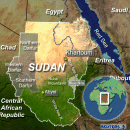Darfur rebels set six conditions for Sudan talks
By Tsegaye Tadesse
ADDIS ABABA, July 16 (Reuters) – Darfur rebel groups set six conditions for peace talks with the Sudanese government due to start in earnest on Friday, including disarming of Arab militias and access for an international inquiry into genocide charges.
 Ahmed Tugod Lissan of the rebel Justice and Equality Movement (JEM), flanked by officials of the Sudan Liberation Army (SLA), said the two groups had jointly agreed the terms and handed them to the African Union (AU), which held a ceremonial opening of the talks on Thursday at its Ethiopian headquatrters.
Ahmed Tugod Lissan of the rebel Justice and Equality Movement (JEM), flanked by officials of the Sudan Liberation Army (SLA), said the two groups had jointly agreed the terms and handed them to the African Union (AU), which held a ceremonial opening of the talks on Thursday at its Ethiopian headquatrters.
“We are not going to engage in political dialogue until the Sudan government fulfills the conditions set by the SLM and JEM, although we will meet the AU officials separately for consultations,” Lissan told reporters.
The other four conditions are bringing criminals who committed genocide or ethnic cleansing to justice, creating unimpeded humanitarian access for delivery of food aid, release of prisoners of war and detainees and agreement on a neutral venue for future talks.
The rebels say Addis Ababa is not a neutral venue because of the Ethiopian government’s friendship with Khartoum.
Lissan added that fulfillment of the six conditions would mean the government had honoured the pledges it made to U.N. Secretary-General Kofi Annan and U.S. Secretary of State Colin Powell on visits they made to Sudan in late June and early July.
The talks, due to get under way at about 1300 GMT, are meant to cover the status of a shaky ceasefire in the remote western region, disarmamant of combatants, the humanitarian situation and deployment of AU ceasefire monitors, AU officials say.
The United Nations says the fighting has displaced more than one million people, triggering one of the world’s worst humanitarian crises. As many as 30,000 people have been killed.
The situation has gained increased urgency with the rainy season already affecting parts of Darfur. Aid workers have said the rain, in addition to continued security concerns, will severely hamper desperately needed humanitarian operations.
But Darfur peace efforts remain difficult, despite pressure from the 53-nation AU, the United Nations and the United States.
JEM and another rebel group, the Sudan Liberation Movement (SLM), say the government has armed Arab militias, known as Janjaweed, to loot and burn African villages in a campaign of ethnic cleansing. Khartoum denies the charge.
After U.N. Secretary-General Kofi Annan’s visit this month to Sudan and neighbouring Chad, Sudan signed a joint communique vowing to disarm the militias, allow unrestricted aid access in the remote west and speed up peace talks with the rebels.
Khartoum signed a truce with the two groups on April 8, but both sides have since accused each other of violations.The two rebels groups launched their rebellion in Darfur last year after long conflict between Arab nomads and African villagers.
The Addis Ababa negotiations are chaired by the AU, the United Nations and Chad, with the United States and European Union attending as observers.
